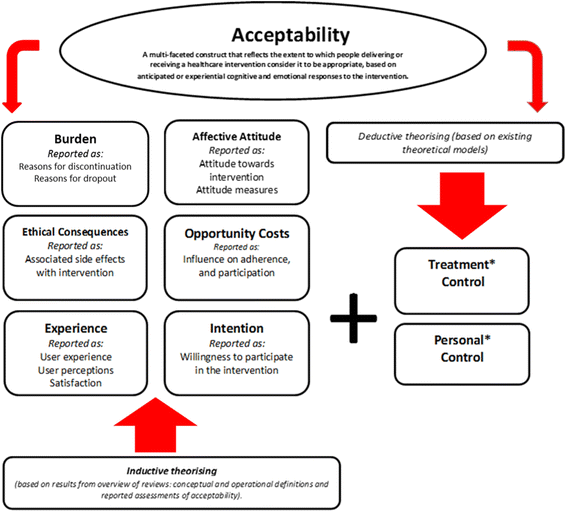Acceptability of healthcare interventions: an overview of reviews and development of a theoretical framework
- PMID: 28126032
- PMCID: PMC5267473
- DOI: 10.1186/s12913-017-2031-8
Acceptability of healthcare interventions: an overview of reviews and development of a theoretical framework
Abstract
Background: It is increasingly acknowledged that 'acceptability' should be considered when designing, evaluating and implementing healthcare interventions. However, the published literature offers little guidance on how to define or assess acceptability. The purpose of this study was to develop a multi-construct theoretical framework of acceptability of healthcare interventions that can be applied to assess prospective (i.e. anticipated) and retrospective (i.e. experienced) acceptability from the perspective of intervention delivers and recipients.
Methods: Two methods were used to select the component constructs of acceptability. 1) An overview of reviews was conducted to identify systematic reviews that claim to define, theorise or measure acceptability of healthcare interventions. 2) Principles of inductive and deductive reasoning were applied to theorise the concept of acceptability and develop a theoretical framework. Steps included (1) defining acceptability; (2) describing its properties and scope and (3) identifying component constructs and empirical indicators.
Results: From the 43 reviews included in the overview, none explicitly theorised or defined acceptability. Measures used to assess acceptability focused on behaviour (e.g. dropout rates) (23 reviews), affect (i.e. feelings) (5 reviews), cognition (i.e. perceptions) (7 reviews) or a combination of these (8 reviews). From the methods described above we propose a definition: Acceptability is a multi-faceted construct that reflects the extent to which people delivering or receiving a healthcare intervention consider it to be appropriate, based on anticipated or experienced cognitive and emotional responses to the intervention. The theoretical framework of acceptability (TFA) consists of seven component constructs: affective attitude, burden, perceived effectiveness, ethicality, intervention coherence, opportunity costs, and self-efficacy.
Conclusion: Despite frequent claims that healthcare interventions have assessed acceptability, it is evident that acceptability research could be more robust. The proposed definition of acceptability and the TFA can inform assessment tools and evaluations of the acceptability of new or existing interventions.
Keywords: Acceptability; Complex intervention; Defining constructs; Healthcare intervention; Theory development.
Figures



Comment in
-
Focusing on the Treatment Acceptability of Noninvasive Brain Stimulation.Neuromodulation. 2023 Apr;26(3):705-706. doi: 10.1016/j.neurom.2023.01.004. Neuromodulation. 2023. PMID: 37028889 No abstract available.
References
-
- MRC U. Developing and evaluating complex interventions: new guidance. London: Medical Research Council; 2008.
MeSH terms
LinkOut - more resources
Full Text Sources
Other Literature Sources
Medical

